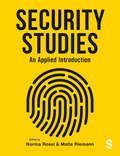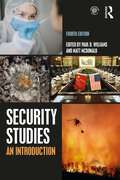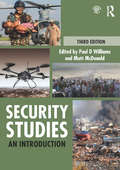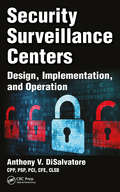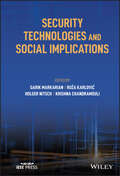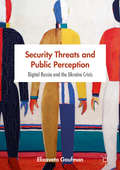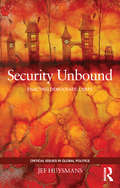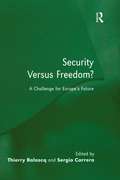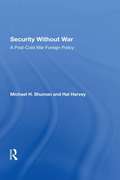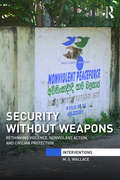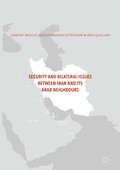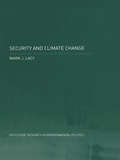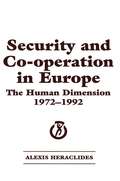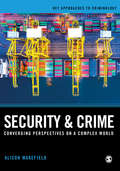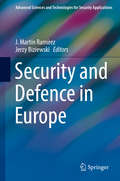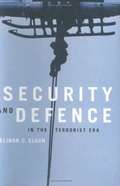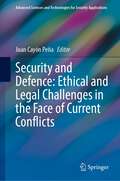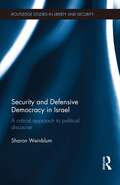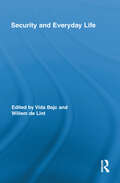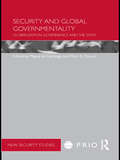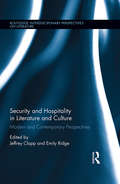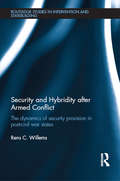- Table View
- List View
Security Studies: An Applied Introduction
by Norma Rossi Malte RiemannSecurity Studies: An Applied Introduction offers a transformative tool to understand, analyse, and engage with the complexities of security in the modern world. This groundbreaking new text redefines the landscape of security studies with the following features: Policy-Relevant: each chapter provides analysis of policy responses to empirical security issues. This practical approach offers a toolkit to assess and contribute to real-world policy discussions. Empirical Application: vividly demonstrating the real-world relevance of Security Studies with online videos from leading security practitioners to show how theory informs practice. Pedagogically Rich: comprehensive online resources and chapters features such as ′security beyond the real′ and hands-on exercises that critically assess real-world security responses and their policy implications that offer ways to apply theoretical concepts in a highly innovative way. Innovative Structure: seamlessly integrating theoretical perspectives with empirical security concerns, this textbook offers a non-compartmentalised approach to theory and practice. Hot Topics: placing contemporary, creative, emerging, and underexplored approaches and empirical topics at the forefront including cyber security, racism, and space security. This is the perfect introduction for undergraduate and postgraduate students studying Security Studies and International or Global Security. Malte Riemann is Assistant Professor in Contemporary Armed Conflict, Leiden University, the Netherlands Norma Rossi is Associate Lecturer in International Relations, University of St Andrews, UK
Security Studies: An Applied Introduction
by Norma Rossi Malte RiemannSecurity Studies: An Applied Introduction offers a transformative tool to understand, analyse, and engage with the complexities of security in the modern world. This groundbreaking new text redefines the landscape of security studies with the following features: Policy-Relevant: each chapter provides analysis of policy responses to empirical security issues. This practical approach offers a toolkit to assess and contribute to real-world policy discussions. Empirical Application: vividly demonstrating the real-world relevance of Security Studies with online videos from leading security practitioners to show how theory informs practice. Pedagogically Rich: comprehensive online resources and chapters features such as ′security beyond the real′ and hands-on exercises that critically assess real-world security responses and their policy implications that offer ways to apply theoretical concepts in a highly innovative way. Innovative Structure: seamlessly integrating theoretical perspectives with empirical security concerns, this textbook offers a non-compartmentalised approach to theory and practice. Hot Topics: placing contemporary, creative, emerging, and underexplored approaches and empirical topics at the forefront including cyber security, racism, and space security. This is the perfect introduction for undergraduate and postgraduate students studying Security Studies and International or Global Security. Malte Riemann is Assistant Professor in Contemporary Armed Conflict, Leiden University, the Netherlands Norma Rossi is Associate Lecturer in International Relations, University of St Andrews, UK
Security Studies: An Introduction
by Paul D. WilliamsSecurity Studies: An Introduction, 4th edition, is the most comprehensive textbook available on the subject, providing students with in-depth coverage of traditional and critical approaches and an essential grounding in the debates, frameworks, and issues of the contemporary security agenda. This new edition has been completely revised and updated, to cover major developments such as COVID-19, the rise of populism, climate change, China and Russia’s place in the world, and the Trump administration. It also includes new chapters on great power rivalry, emerging technologies, and economic threats. Divided into four parts, the text provides students with a detailed, accessible overview of the major theoretical approaches, key themes, and most significant issues within security studies. Part 1 explores the main theoretical approaches from both traditional and critical standpoints Part 2 explains the central concepts underpinning contemporary debates Part 3 presents an overview of the institutional security architecture Part 4 examines some of the key contemporary challenges to global security Collecting these related strands into a single textbook creates a valuable teaching tool and a comprehensive, accessible learning resource for undergraduates and MA students.
Security Studies: An Introduction (Routledge Critical Security Studies)
by Paul D. Williams Matt McDonaldSecurity Studies: An Introduction, 3rd edition, is the most comprehensive textbook available on the subject, providing students with an essential grounding in the debates, frameworks, and issues on the contemporary security agenda. This new edition has been comprehensively revised and updated, with new chapters added on poststructuralism, postcolonialism, securitization, peace and violence, development, women, peace and security, cybersecurity, and outer space. Divided into four parts, the text provides students with a detailed, accessible overview of the major theoretical approaches, key themes, and most significant issues within security studies. Part 1 explores the main theoretical approaches from both traditional and critical standpoints Part 2 explains the central concepts underpinning contemporary debates Part 3 presents an overview of the institutional security architecture Part 4 examines some of the key contemporary challenges to global security Collecting these related strands into a single textbook creates a valuable teaching tool and a comprehensive, accessible learning resource for undergraduates and MA students.
Security Surveillance Centers: Design, Implementation, and Operation
by Anthony V. DiSalvatoreUnlike current books on the market that focus primarily on the technical aspects of surveillance and protection, Security Surveillance Centers: Design, Implementation, and Operation focuses on the operation of a security surveillance center. This text explains in detail the role of security surveillance, as well as the critical aspects of the design, implementation, and operation of security surveillance centers of all sizes. Step-by-step coverage of policy and procedures, as well as the inclusion of industry-specific operational forms, guarantee a practical, user-friendly text for all levels of readers. Intended for any individuals or organizations currently employing security surveillance systems, this book is an asset for all users, from trainees to supervisors, seeking to create a more secure environment for themselves and for others.
Security Technologies and Social Implications
by Garik Markarian Ru A Karlovi Holger Nitsch Krishna ChandramouliB>SECURITY TECHNOLOGIES AND SOCIAL IMPLICATIONS Explains how the latest technologies can advance policing and security, identify threats, and defend citizens from crime and terrorism Security Technologies and Social Implications focuses on the development and application of new technologies that police and homeland security officers can leverage as a tool for both predictive and intelligence-led investigations. The book recommends the best practices for incorporation of these technologies into day-to-day activities by law enforcement agencies and counter-terrorism units. Practically, it addresses legal, technological, and organizational challenges (e.g. resource limitation and privacy concerns) combined with challenges related to the adoption of innovative technologies. In contrast to classic tools, modern policing and security requires the development and implementation of new technologies using AI, machine learning, social media tracking, drones, robots, GIS, computer vision, and more. As crime (and cybercrime in particular) becomes more and more sophisticated, security requires a complex mix of social measures, including prevention, detection, investigation, and prosecution. Key topics related to these developments and their implementations covered in Security Technologies and Social Implications include: New security technologies and how these technologies can be implemented in practice, plus associated social, ethical or policy issues Expertise and commentary from individuals developing and testing new technologies and individuals using the technologies within their everyday roles The latest advancements in commercial and professional law enforcement technologies and platforms Commentary on how technologies can advance humanity by making policing and security more efficient and keeping citizens safe Security Technologies and Social Implications serves as a comprehensive resource for defense personnel and law enforcement staff, practical security engineers, and trainee staff in security and police colleges to understand the latest security technologies, with a critical look at their uses and limitations regarding potential ethical, regulatory, or legal issues.
Security Threats and Public Perception
by Elizaveta GaufmanCountless attempts at analyzing Russia's actions focus on Putin to understand Russia's military imbroglio in Ukraine, hostility towards America, and disdain of 'Gayropa'. This book invites its readers to look beyond the man and delve into the online lives of millions of Russians. It asks not the question of what the threats are to Russia's security, but what they are perceived to be by digital Russia. The author examines how enemy images are manufactured, threats magnified, stereotypes revived, memories implanted and fears harnessed. It looks at the legacy of the Soviet Union in shaping discussions ranging from the Ukraine crisis to the Pussy Riots trial, and explores the complex inter-relation between enemy images at the governmental level and their articulation by the general public. By drawing on the fields of international relations, memory studies, visual studies, and big data, this book addresses the question of why securitization succeeds - and why it fails. "Security theory meets the visual turn and goes to Russia, where old tsarist and Soviet tropes are flooding the internet in support of Putin's neo-tsarism. A magical mystery tour that comes recommended. Iver B. Neumann, author of "Russia and the Idea of Europe" "The novelty of her approach is in going beyond the traditional top down perspective and capturing the receptivity and contribution of various social groups to securitized discourses. " Andrei P. Tsygankov, author of "Russia's Foreign Policy: Change and Continuity in National Identity". "When do scary proclamations of security threats attract an audience? When does securitization work? 'Security Threats and Public Perception' combines in-depth analysis of the Ukraine Crisis in the Russian digital media with discourse theory to make an innovative argument about how and when people believe that they are insecure. A must read!" Laura Sjoberg, Assistant Professor of Political Science, University of Florida, USA
Security Unbound: Enacting Democratic Limits (Critical Issues in Global Politics)
by Jef HuysmansSecurity concerns have mushroomed. Increasingly numerous areas of life are governed by security policies and technologies. Security Unbound argues that when insecurities pervade how we relate to our neighbours, how we perceive international politics, how governments formulate policies, at stake is not our security but our democracy. Security is not in the first instance a right or value but a practice that challenges democratic institutions and actions. We are familiar with emergency policies in the name of national security challenging parliamentary processes, the space for political dissent, and fundamental rights. Yet, security practice and technology pervade society heavily in very mundane ways without raising national security crises, in particular through surveillance technology and the management of risks and uncertainties in many areas of life. These more diffuse security practices create societies in which suspicion becomes a default way of relating and governing relations, ranging from neighbourhood relations over financial transactions to cross border mobility. Security Unbound demonstrates that governing through suspicion poses serious challenges to democratic practice. Some of these challenges are familiar, such as the erosion of the right to privacy; others are less so, such as the post-human challenge to citizenship. Security unbound provokes us to see that the democratic political stake today is not our security but preventing insecurity from becoming the organising principle of political and social life.
Security Versus Freedom?: A Challenge for Europe's Future
by Thierry BalzacqFrom the viewpoint of migration and asylum policy and the fight against terrorism, justice and home affairs is a key policy area. It is also an area that raises important challenges and questions with regard to the preservation of fundamental freedoms. This engaging volume examines the emerging European Union area of freedom, security and justice at a time when key policy priorities are taking shape within the EU. Bringing together contributors from different backgrounds, the volume is ideal for students and scholars of European studies, law, political science, political theory and sociology.
Security Without War: A Post-cold War Foreign Policy
by Michael Shuman Hal HarveyThe Cold War may be over, but the United States is still practicing Cold War foreign policies. From the Persian Gulf to El Salvador, from Bosnia to Somalia, U.S. policymakers continue to rely on force, threats, arms, and military aid. A fundamental redefinition of national security–beyond war and militarization, beyond bilateralism, beyond sovereign states–is long overdue. In Security Without War, a dynamic author team lays out new principles and policies for the United States to adopt in a post-Cold War world. Shuman and Harvey encourage Americans to take account of all threats (not just military ones), to emphasize preventing conflicts over winning wars, to enhance every nation's security (including that of its enemies), to favour multilateral approaches over bilateral ones, and to promote greater citizen participation in foreign policy. Throughout, they show how military, political, economic, and environmental security interests are all linked–and how emphasizing one over the others can undermine the nation's safety. Security Without War brings together for the first time the major elements of post-Cold War security thought. The authors show how a new framework for U.S. international relations can enhance U.S.–and indeed, global–security at a substantially lower cost.
Security Without Weapons: Rethinking violence, nonviolent action, and civilian protection (Interventions)
by M. S. WallaceFew questions of global politics are more pressing than how to respond to widespread violence against civilians. Despite the efforts of Responsibility to Protect (R2P) proponents to draw attention away from exclusively military responses, debates on humanitarian intervention and R2P’s “Third Pillar” still tend to boil down to two unsatisfying options: stand by and “do nothing” or take military action to protect civilians – essentially using violence to stop violence. Accordingly – and given disagreement and uncertainty regarding moral claims, as well as the unpredictability of military effectiveness – this book asks: how can we counter violence ethically and effectively, taking action consistent with our particular moral commitments while also nurturing difference and enacting responsibility towards multiple others? After evaluating the pragmatic and ethical failings of military action, the book proposes nonviolent intervention as a third – unarmed, on-the-ground – option for protecting civilians during humanitarian crises. In the empirical section of the book, focusing on the discursive and psychological conditions enabling violence, Wallace analyses the mechanisms by which Nonviolent Peaceforce – an international NGO engaged in nonviolent intervention/ unarmed civilian peacekeeping (UCP) – was able to protect civilians and prevent violence, even if on a limited scale, in the broader context of Sri Lanka’s war/counterinsurgency in 2008. Both philosophically innovative and practically useful to those working in the field, the book contributes to a range of literatures and debates: from just war theory and poststructuralist ethics to nonviolent action and conflict transformation, and from humanitarian intervention, R2P, and civilian protection to strategic theory and discursive and psychological theories of violence.
Security Without Weapons: Rethinking violence, nonviolent action, and civilian protection (Interventions)
by M. S. WallaceFew questions of global politics are more pressing than how to respond to widespread violence against civilians. Despite the efforts of Responsibility to Protect (R2P) proponents to draw attention away from exclusively military responses, debates on humanitarian intervention and R2P’s “Third Pillar” still tend to boil down to two unsatisfying options: stand by and “do nothing” or take military action to protect civilians – essentially using violence to stop violence. Accordingly – and given disagreement and uncertainty regarding moral claims, as well as the unpredictability of military effectiveness – this book asks: how can we counter violence ethically and effectively, taking action consistent with our particular moral commitments while also nurturing difference and enacting responsibility towards multiple others?After evaluating the pragmatic and ethical failings of military action, the book proposes nonviolent intervention as a third – unarmed, on-the-ground – option for protecting civilians during humanitarian crises. In the empirical section of the book, focusing on the discursive and psychological conditions enabling violence, Wallace analyses the mechanisms by which Nonviolent Peaceforce – an international NGO engaged in nonviolent intervention/ unarmed civilian peacekeeping (UCP) – was able to protect civilians and prevent violence, even if on a limited scale, in the broader context of Sri Lanka’s war/counterinsurgency in 2008.Both philosophically innovative and practically useful to those working in the field, the book contributes to a range of literatures and debates: from just war theory and poststructuralist ethics to nonviolent action and conflict transformation, and from humanitarian intervention, R2P, and civilian protection to strategic theory and discursive and psychological theories of violence.
Security and Bilateral Issues between Iran and its Arab Neighbours
by Anoushiravan Ehteshami Gawdat Bahgat Neil QuilliamThis book provides a detailed analysis of the complicated relations between Iran and its Arab neighbours. Arab perceptions of Iran, its regional policies and role in the Arab region, have never been more complicated than today. How is one to make sense of the increasingly complex and at times tense relationship between Iran and its Arab neighbours? Given the strategic significance of this sub-region and the importance of relations between its states to international security, this edited volume systematically accounts for each Arab neighbour's perception, policies and approach towards the Islamic republic, for the first time providing a clear and detailed comparative analysis of these relationships. This book, bringing together a group of leading scholars of the region, not only provides a clear lens for the policy community through which to gauge the causes of change and the reasons for continuity in relations, but also offers an invaluable tool for scholars of the wider region and the growing community of researchers focusing on this sub-region.
Security and Climate Change: International Relations and the Limits of Realism (Environmental Politics)
by Mark LacyThis new book explains why the international community has responded with a sense of fatalistic passivity to climate change. It presents a distinct critique of realism through the study of this topic, commonly overlooked in international relations. The author argues that the realist view rests on a dangerous contradiction; far from delivering security it serves to limit the way we think about the new generation of risks we face. The book also provides a detailed case study evaluating US climate politics under the Clinton and Bush administrations.
Security and Co-operation in Europe: The Human Dimension 1972-1992
by Alexis HeraclidesThe human dimension of the Conference on Security and Co-operation in Europe (CSCE) implies an alternative vision of security and co-operation in Europe, based on respect for human rights, democracy, the rule of law, minority rights and human contacts. Until recently the human dimension has been the main claim to perpetuity of the CSCE. It has been through the years the main point of controversy among its participating states, and has played an important role in the revolutionary events of 1989 which transformed Europe.
Security and Crime: Converging Perspectives on a Complex World (Key Approaches to Criminology)
by Alison WakefieldSecurity and Crime is an authoritative and multidisciplinary analysis of the relationship between security and crime, addressing much of the confusion about its nature and meaning, clarifying its relevance to criminological analysis, and giving due attention to the interdisciplinary nature of the topic. Providing an historical and prospective look at issues within security the book will: trace the development of ′security′ across disciplines situate this contested concept within criminological discourse and concerns explore the rising attention in politics and academic scholarship to ′security′ issues as they relate to crime examine the nature and organisation of interventions to deliver security establish clearly the relationship between security, crime and criminology. International in scope, and broad in coverage, Security and Crime sets out the need to broaden the study of security in a clear, concise style that is easy for students to digest. With comprehensive pedagogical feature including chapter overviews, key terms, study questions, further reading and a glossary, this book is essential for students studying security in criminology, criminal justice, international relations, and related disciplines.
Security and Crime: Converging Perspectives on a Complex World (Key Approaches to Criminology)
by Alison WakefieldSecurity and Crime is an authoritative and multidisciplinary analysis of the relationship between security and crime, addressing much of the confusion about its nature and meaning, clarifying its relevance to criminological analysis, and giving due attention to the interdisciplinary nature of the topic. Providing an historical and prospective look at issues within security the book will: trace the development of ′security′ across disciplines situate this contested concept within criminological discourse and concerns explore the rising attention in politics and academic scholarship to ′security′ issues as they relate to crime examine the nature and organisation of interventions to deliver security establish clearly the relationship between security, crime and criminology. International in scope, and broad in coverage, Security and Crime sets out the need to broaden the study of security in a clear, concise style that is easy for students to digest. With comprehensive pedagogical feature including chapter overviews, key terms, study questions, further reading and a glossary, this book is essential for students studying security in criminology, criminal justice, international relations, and related disciplines.
Security and Defence in Europe (Advanced Sciences and Technologies for Security Applications)
by J. Martín Ramírez Jerzy BiziewskiThis book argues that security and defense have never been true priorities in the European Union, and have constantly been marginalized by the elites since the Soviet Union collapsed and the Warsaw Pact disintegrated. Despite the official rhetoric, only a few tangible results can be presented concerning the operational readiness of European forces, and the EU’s inability to act was proven during the crises in the Balkans, NATO has experienced similar problems, as the majority of its members are EU countries. Both organizations have declared their resolve concerning the security and defense of their nations and territories, but, unfortunately, little has been done to lend these statements credence. In this context, the book analyzes several aspects of EU security and defense, including: the EU – NATO relationship, common defense policy and strategy, common capability building, common understanding of strategic changes, common operational planning and centrally synchronized exercises based on operational planning, etc. The member states have helped to make EU/NATO effective organizations, but unfortunately their individual interests and priorities constitute real challenges. This aspect should be discussed and addressed by political and military elites, scholars, analysts, students and the general public alike.
Security and Defence in the Terrorist Era
by Elinor C. SloanCanada's traditional approach to security - "the best defence is a good offence" - became even more entrenched following 9/11. Elinor Sloan challenges this notion, arguing that "defensive" military and civilian measures at home are just as important to Canada as "offensive" military activities abroad. Security and Defence in the Terrorist Era looks at the nature of the post-9/11 threat environment, U.S. security and defence policy since the Cold War ended, intelligence gathering, and changes in military personnel and equipment requirements for addressing threats overseas. While Sloan favours increasing Canadian military capabilities, she shows that they also need to be reorganized. She emphasizes the importance of development aid and diplomacy in helping to rebuild failed states abroad and further suggests that Canada participate in the US strategic missile defence system as a logical extension of NORAD, which will otherwise become irrelevant.Sloan concludes that Canada's military capabilities fall well short of what is necessary to guarantee security and that changes are necessary to regain credibility and influence with the US.
Security and Defence: Ethical and Legal Challenges in the Face of Current Conflicts (Advanced Sciences and Technologies for Security Applications)
by Juan Cayón PeñaThis book aspires to face the challenge of analyzing with due academic rigor, always in the paradigm of security and advanced sciences, but without forgetting the ethical questions that our world raises every day. The work is divided into two main sections: the first section is focused on the cyber world, with not only technical but also legal derivations given the expansion of vulnerabilities and our technological dependence. The second section, with a more interdisciplinary nature, runs through undeniably topical issues such as territorial problems and the potential decline of the traditional States, the communicational impact of information management and false news, or the commitment to essential freedoms for the West. This book connects advanced technologies and ethical issues and includes discussions on recent crises such as COVID-19. It also provides an interdisciplinary view on the ethical issues for security technologies.
Security and Defensive Democracy in Israel: A Critical Approach to Political Discourse (Routledge Studies in Liberty and Security)
by Sharon WeinblumThis book scrutinises how political actors in the Israeli parliament (the Knesset) have articulated the security-democracy nexus in their discourses. Security crises expose political leaders to an uncomfortable dilemma: guaranteeing the safety of citizens while at the same time preserving democratic principles, basic rights and liberties. In this respect, Israel represents an archetypical case. Defining itself as a democracy, the state of Israel has been in quasi-constant conflict with its neighbouring countries while facing terror attacks repeatedly. This situation has resulted in the upholding of the state of emergency since the establishment of the state in 1948 and in the enactment of security measures that are often in conflict with democratic values. The tension between security and democracy is not a new question: it has been at the centre of political thought from Rousseau and Locke to Lasswell and Dahl and stood at the core of political debates after 9/11 and the 2005 terror attacks in London. Many studies have questioned how political actors manage this tension or how they could – properly – balance security and democracy. Yet, in spite of the abundant literature on the issue, the manner in which political actors conceptualise and frame this tension has been rarely explored. Even less has been said on the effects of this conceptualisation on the democratic regime. Drawing on discourse theory and on an innovative narrative analysis, the book examines 40 debates held in the Knesset on security-oriented laws enacted in two different contexts: the period of relative calm preceding the first Palestinian intifada (1987) and the period following the eruption of the second intifada (2000). More specifically, three types of laws and discussions are examined: laws establishing a relation between freedom of expression and security; laws linking the category of 'the enemy' to democracy; and finally those connecting the right to family unification and residence of Palestinians with terrorism. Through a comparative analysis of the political actors’ discourses in 1985 and between 2000 and 2011, the study demonstrates that two main narratives have constantly competed: on the one hand a marginal narrative anchored in basic rights and on the other a defensive democracy narrative, which has become dominant. The latter has legitimised the restriction of freedom of expression, freedom to participate in elections, freedom of movement or the right to citizenship. The book shows how the increasing dominance of the defensive democracy narrative has had a fundamental impact in reshaping the polity and the identity of Israel’s democratic regime. The analysis ultimately opens the possibility to rethink the conventional approach of the security-democracy dilemma and to reflect on processes in other states, such as the United Kingdom or the United States during different security crises. This book will be of much interest to students of critical security studies, Israeli politics, democracy studies, political theory and IR in general.
Security and Everyday Life (Routledge Advances in Criminology)
by Vida BajcWhen everyday social situations and cultural phenomena come to be associated with a threat to security, security becomes a value which competes with other values – particularly the right to privacy and human rights. In this comparison, security appears as an obvious choice over the loss of some aspects of other values and is seen as a reasonable and worthwhile sacrifice because of what security promises to deliver. When the value of security is elevated to the top of the collective priorities, it becomes a meta-frame, a reference point in relation to which other aspects of social life are articulated and organized. With the tendency to treat a variety of social issues as security threats and the public’s growing acceptance of surveillance as an inevitable form of social control, the security meta-frame rises to the level of a dominant organizing principle in such a way that it shapes the parameters and the conditions of daily living. This volume offers case studies from multiple countries that show how our private and public life is shaped by the security meta-frame and surveillance. It is essential reading for everyone who is interested in the changes to be faced in social life, privacy, and human freedoms during this age of security and surveillance.
Security and Global Governmentality: Globalization, Governance and the State (PRIO New Security Studies)
by Miguel De LarrinagaThis book examines global governance through Foucaultian notions of governmentality and security, as well as the complex intersections between the two. The volume explores how Foucault's understanding of the general economy of power in modern society allows us to consider the connection of two broad possible dynamics: the global governmentalization of security and the securitization of global governance. If Foucault's work on governmentality and security has found resonance in IR scholarship in recent years it is in large part due to his understanding of how these forms of power must necessarily take into account the management of circulation that, in seeking to maximize ‘good’ versus ‘bad’ circulatory flows, brings into play and problematizes the 'inside'/'outside' upon which domestic and international spaces have been traditionally understood. Indeed, Foucault introduces a set of conceptual tools that can inform our analyses of globalization, global governance and security in ways that have been left largely unexplored in the discipline of IR. Miguel de Larrinaga is Assistant Professor at the University of Ottawa where he has been teaching since 2002. Marc G. Doucet is an Associate Professor in the Department of Political Science at Saint Mary’s University.
Security and Hospitality in Literature and Culture: Modern and Contemporary Perspectives (Routledge Interdisciplinary Perspectives on Literature)
by Emily Ridge Jeffrey ClappWith contributions from an international array of scholars, this volume opens a dialogue between discourses of security and hospitality in modern and contemporary literature and culture. The chapters in the volume span domestic spaces and detention camps, the experience of migration and the phenomena of tourism, interpersonal exchanges and cross-cultural interventions. The volume explores the multifarious ways in which subjects, citizens, communities, and states negotiate the mutual, and potentially exclusive, desires to secure themselves and offer hospitality to others. From the individual’s telephone and data, to the threshold of the family home, to the borders of the nation, sites of securitization confound hospitality’s injunction to openness, gifting, and refuge. In demonstrating an interrelation between ongoing discussions of hospitality and the intensifying attention to security, the book engages with a range of literary, cultural, and geopolitical contexts, drawing on work from other disciplines, including philosophy, political science, and sociology. Further, it defines a new interdisciplinary area of inquiry that resonates with current academic interests in world literature, transnationalism, and cosmopolitanism.
Security and Hybridity after Armed Conflict: The Dynamics of Security Provision in Post-Civil War States (Routledge Studies in Intervention and Statebuilding)
by Rens C. WillemsThis book examines the dynamics of security provision in international interventions in post-conflict states. It focuses on how international security interventions – such as Disarmament, Demobilisation and Reintegration (DDR) programmes, Security Sector Reform (SSR) and Armed Violence Reduction (AVR) – play out in the post-civil war context in which they are implemented. The underlying assumptions of such interventions are that the state is the best placed to organise violence, that the ideal state has to function as an organisation with the legitimate monopoly on the use of violence, and that the primary task of the state is the provision of security. Post-civil war contexts, however, are characterised by hybridity, in which various authority structures are overlapping, cooperating and competing. The interactions between different security actors (both state and non-state) create struggles in society about whose security interests are promoted, which actions to provide security are considered legitimate, and about who is considered a legitimate security actor. This book investigates the interactions between international actors organising and supporting security interventions and the local security dynamics created by the interactions between both state and non-state actors involved in security. It draws on extensive field research in Eastern Democratic Republic of Congo, Burundi and South Sudan. This book will be of much interest to students of statebuilding, peacebuilding, peace and conflict studies, security studies and IR.
